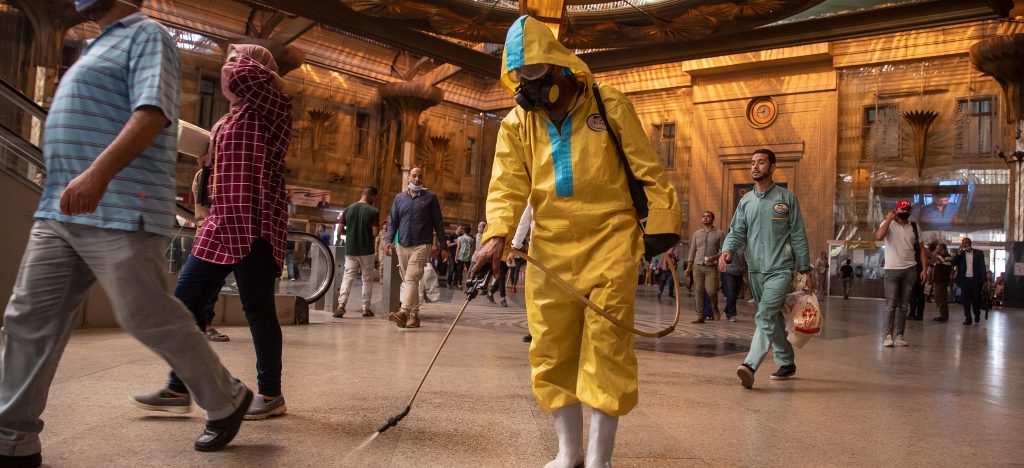
#IpevLive |The Pandemic as a Magnifying Glass
In the fourth #IpevLive conversation “The Pandemic As a Magnifying Glass”, that took place on June 8, 2021, Rim Turkmani from The London School of Economics, Marie Kortam from the Institut français du Proche-Orient, Jalel Harchaoui from The Global Initiative against Transnational Organized Crime and Tarik Yousef from Brookings Center in Doha discussed with Journalist Hal Plotkin how the Covid19 pandemic has highlighted governance weaknesses in the MENA region and contributed to their ongoing crisis of legitimacy.
Listen to the podcast!
Highlights
Rim Turkmani observed that the pandemic has exposed a variety of fissures in the Arab world. According to her, the international community cannot afford to respond to violence in the MENA region primarily with a humanitarian response. Instead, she argued, interventions in the region should also address socio-economic issues which are the root causes of instability. This argument was supported by Marie Kortam who argued that the Covid crisis has impacted countries on the micro and macro levels as well as vulnerable groups such as children refugees, women, and prisoners. According to Tarik Yousef, the Covid 19 crisis is the biggest economic crisis the MENA region has ever known, and demonstrates the urgent necessity of having competent states and efficient governments. At the same time, Jalel Harchaoui, noted that the Covid crisis did not weaken authoritarian regimes, as many had hoped, but instead saw some regimes, sensing the weakening of adversaries, saw it as an opportunity to attack other regimes.
Likewise, Tarik Yousef pointed out the fact that in the last 10 years, much of the world was preoccupied with hopes of a democratic transition in the MENA region while, at the same time, bureaucracies and public sectors were neglected into states of paralysis. “This agenda we had neglected should be revived,” he said. “We must deal with poverty and the need for a viable public sector,” he added. Jalel Harchaoui added his plea for more fieldwork to understand the changes and the feelings on the local level. “After 12 months that we were not able to do fieldwork, donors should not think that we can avoid that, because we need to go back to the field,” he maintained. Marie Kortam called for International donors to promote and listen to researchers and argued that providing hope for social justice is essential because the first driver, the primary motivation, in joining a terrorist group or organised crime is often the feeling and experience of injustice.
Rim Turkmani agreed on the need to continue to consider politics even while addressing humanitarian concerns. “Separating humanitarian aid while ignoring political legitimacy, transparency, inclusivity and international law is not the solution,” she maintained. Tarik Yousef concluded the panel discussion with an optimistic thought, saying that “the spread of pandemics and economic direness have brought conflicts exhaustion and lessened the intensity of conflicts in Syria, Yemen and Libya. So there is now,” he noted, “a window of new opportunities”.
